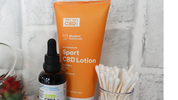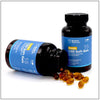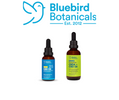CBD vs THC: What’s the Difference and Why It Matters in 2025
In 2025, understanding the differences between CBD and THC is more important than ever. With the rise in popularity of cannabis products, many people still confuse these two compounds. Both come from the cannabis plant, but they have distinct effects and legal statuses. This article will clarify what sets them apart and why it matters for your wellness choices.
CBD vs THC: Key Takeaways
-
CBD is non-intoxicating and used for wellness; THC is psychoactive and often linked to recreational use.
-
CBD is legal in many places as long as it contains less than 0.3% THC; THC's legality varies widely by state.
-
Both compounds interact with the body's endocannabinoid system but produce different effects.
-
Products can be labeled as full-spectrum, broad-spectrum, or isolate, affecting THC content.
-
Choosing between CBD and THC depends on personal goals, so consulting a healthcare professional is recommended.
Introduction
It’s 2025, and you’re probably hearing a lot about CBD and THC. They’re everywhere – in oils, gummies, even pet treats! But what exactly are they? And more importantly, what’s the difference? A lot of people use the terms interchangeably, but that’s a mistake. This guide will break down the key differences between CBD and THC, explaining what makes each unique and why understanding those differences matters, especially now. We’ll look at everything from their chemical structures to their legal status, so you can make informed choices about what you put in your body. Think of it as your friendly, no-nonsense guide to the world of cannabinoids. We’ll even touch on how cannabinoids work in your body.
Both CBD and THC are derived from the Cannabis sativa plant, which includes both hemp and marijuana varieties.
It’s easy to get lost in the jargon, but don’t worry, we’ll keep it simple. By the end, you’ll know the basics and be able to tell your CBD from your THC with confidence.
What Is CBD?
Non-intoxicating Compound from Hemp
So, what is cbd anyway? Cannabidiol, or CBD, is a naturally occurring compound found in hemp plants. Unlike its cousin THC, CBD is non-intoxicating, meaning it won’t get you high. It’s become super popular because people are exploring its potential wellness benefits without the psychoactive effects.
Often Used in Daily Wellness Routines
People use it for a variety of reasons, and it’s become a pretty common addition to many wellness regimens.
When you buy cbd, you’ll notice there’s a ton of variety. Here are a few popular options:
-
CBD Oil: This is probably the most common form. You can take it sublingually (under the tongue) for quick absorption. However, cbd oil is a versatile option that can be added to food, drinks, or taken on its own.
-
CBD Gummies: A tasty and discreet way to get your daily serving. They come in all sorts of flavors and strengths.
-
CBD Capsules: Easy to use and provide a consistent serving.
-
Topicals: Creams and lotions infused with CBD, used for targeted relief and skin health.
It’s important to remember that everyone reacts differently to CBD. What works for one person might not work for another. Start with a low amount and gradually increase until you find what works best for you.
What Is THC?
Primary Psychoactive Compound in Cannabis
THC, or tetrahydrocannabinol, is the main psychoactive compound found in cannabis plants. It’s what causes the “high” that people often associate with marijuana. When you ingest or inhale THC, it interacts with the endocannabinoid system in your brain, leading to altered mood, perception, and cognitive function. It’s a pretty powerful chemical, and its effects can vary quite a bit from person to person.
Cannabis products, including those containing THC, face significant regulatory challenges and scrutiny, particularly regarding labeling accuracy and legality.
Legal Status Varies by State
One of the trickiest things about THC is its legal status. Unlike CBD, which is often more widely accepted, THC’s legality is a patchwork across the United States. Some states have fully legalized it for both recreational and medical use, while others have strict restrictions or outright bans. It’s super important to know the laws in your state before you even think about buying or using THC products. Otherwise, you could be facing some serious legal trouble. The legal limit for THC in hemp and CBD products is set at 0.3% THC.
THC is classified under controlled substances, and the 2018 Farm Bill removed hemp-derived products from the Controlled Substances Act, making CBD legal federally if it contains less than 0.3% THC.
Often Associated With Recreational Use
THC is frequently linked to recreational cannabis use because of its intoxicating effects. People use it for various reasons, like relaxation, creativity, or just to have a good time. There's growing interest in its potential applications, but more research is definitely needed.
CBD vs THC: Key Differences
Chemical Structure & Source
CBD and THC share a similar chemical makeup: 21 carbon atoms, 30 hydrogen atoms, and 2 oxygen atoms. The difference lies in the arrangement of these atoms.
THC is mainly sourced from marijuana plants, while CBD is usually extracted from hemp plants.Cannabis-derived products, including CBD and THC, are subject to different regulatory discussions and findings regarding their safety, labeling, and marketing practices.
CBD products are widely available, both online and in stores, across the United States. You can find everything from CBD oils and gummies to topicals and capsules. THC products, however, are limited to states where cannabis is legal. Even within those states, there may be restrictions on the types of products available and where you can purchase them.
Here's a simple comparison of CBD vs THC:
|
Feature |
CBD |
THC |
|
Source |
Hemp |
Marijuana |
|
Intoxication |
Non-intoxicating |
Intoxicating |
|
Federal Legality |
Legal (with <0.3% THC) |
Illegal |
|
Availability |
Widely available |
Limited to legal states |
|
Common Use |
Wellness, stress, discomfort management |
Recreational, appetite stimulation, pain |
Understanding these key differences is important when choosing between CBD and THC. Consider your personal goals, legal restrictions, and comfort level with potential psychoactive effects. Some people find that cbd with thc works best for them, while others prefer to avoid THC altogether.
How CBD and THC interact with the body
CBD and THC, two of the most well-known cannabinoids found in the cannabis plant, interact with the body through the endocannabinoid system (ECS). However, their effects are distinct due to their different mechanisms of action. THC binds to the CB1 receptors in the brain, leading to psychoactive effects such as altered mood and perception. This is why THC is often associated with the high that comes from marijuana use.
In contrast, CBD has a more subtle impact on the ECS. It doesn’t bind directly to the cannabinoid receptors but is believed to influence the system by increasing the levels of anandamide, a natural cannabinoid produced by the body. The pharmacological effects of both CBD and THC are still being researched.
Can CBD Products Contain THC?
So, can your CBD products contain THC? The short answer is yes, sometimes. It really boils down to the type of CBD product you’re using. Full-spectrum CBD products are the ones containing CBD with THC. These products contain all the naturally occurring compounds found in the cannabis plant, including trace amounts of THC. It’s all part of the extraction process, where everything is pulled out together to try and get the full range of benefits.
Additionally, the FDA has not approved nonprescription CBD products, which can lead to issues with product labeling and legal uncertainties.
Legal THC Threshold (0.3%)
Now, before you panic, there’s a legal limit. In the United States, CBD products are legal on a federal level as long as they contain no more than 0.3% THC by dry weight. This threshold was established in the 2018 Farm Bill. This amount is generally considered non-intoxicating, meaning it shouldn’t get you high. However, it’s still important to be aware of this, especially if you’re sensitive to THC or subject to drug testing. Always check the product’s Certificate of Analysis (COA) to confirm the THC content.
.
Why Some Consumers Prefer CBD With THC
Some people actually prefer CBD with THC, even if it's just a little bit. This is because of something called the "entourage effect." The idea is that all the different compounds in the cannabis plant – cannabinoids, terpenes, flavonoids – work together synergistically to produce a greater effect than any one compound alone. Some users find that even a small amount of THC enhances their desired effects of CBD, providing better relief for things like discomfort, stress, and relaxation. It's all about finding what works best for your body and needs. You can buy CBD blends to find the right combination.
CBD vs THC: Is One Better Than the Other?
It's a common question: CBD vs THC… What’s the superior choice? The truth is, there's no simple answer. It really boils down to what you're hoping to achieve and what you feel comfortable with. What works wonders for one person might not be the best fit for another. Let's explore this a bit more.
Depends on Personal Goals and Comfort
The 'better' option hinges entirely on your individual needs and preferences. Are you looking for something to potentially ease stress without any intoxicating effects? Then CBD might be your go-to. Or, are you seeking something that could help with discomfort relief and are okay with the slight potential psychoactive effects? THC might be more suitable (Note: the legal limit of 0.3% THC makes the CBD with THC non-psychoactive. However, the trace amount of THC can interfere with drug tests.). Some people find that CBD cream works best for localized temporary body aches, while others prefer the overall effect of THC. It's a personal journey of discovery.
Consult Professionals
While online resources can be helpful, they’re no substitute for personalized advice. Before incorporating CBD or THC into your routine, it’s wise to have a chat with a healthcare professional. They can assess your specific situation, consider any existing health conditions or medications, and provide tailored recommendations. CBD can interact with certain medications, potentially leading to adverse reactions, so it is important to consult a healthcare professional to ensure safe usage, especially when combined with other medications.
Ultimately, the choice between CBD vs THC is a personal one. There’s no one-size-fits-all answer, and what works best for you might be different from what works for someone else. The most important thing is to do your research, consult with professionals, and make informed decisions that align with your individual needs and goals.
Where to Buy CBD You Can Trust
Finding trustworthy CBD can feel like a maze, but it doesn’t have to be! The key is knowing what to look for and understanding the different types of products available. It’s all about doing a little homework to ensure you’re getting a safe and effective product. The legal landscape surrounding selling CBD varies by state, and it is important to be aware of local regulations and compliance issues.
First, decide what kind of CBD experience you’re after. Do you want absolutely zero THC? Then you’ll want to focus on CBD isolates. If you’re okay with a tiny amount, then full-spectrum might be a better fit. Broad-spectrum CBD fits somewhere in the middle because it contains additional cannabinoids and terpenes, but the THC has been removed (0.01% or less).
Here’s a quick rundown:
-
Isolate: Pure CBD, no other cannabinoids or terpenes.
-
Broad-spectrum: Contains multiple cannabinoids and terpenes, but with THC removed.
-
Full-spectrum: Contains all the cannabinoids and terpenes found in the hemp plant, including a small amount of THC (less than 0.3%).
Always check for third-party lab testing. This is a non-negotiable! Reputable brands like Bluebird Botanicals will provide Certificates of Analysis (COAs) that verify the CBD content and confirm the product is free from harmful contaminants. Don’t be afraid to ask for these reports; transparency is key.
Next, consider where you’re buying from. Online retailers often offer a wider selection and competitive prices, but it’s important to do your research. Look for brands with positive reviews and clear information about their sourcing and manufacturing processes. Shopping for CBD online can be a great option if you know what to look for.
Here is a recap of things to keep in mind:
-
Read reviews: See what other customers are saying about the product and the brand.
-
Check the source: Where does the hemp come from? Is it grown organically?
-
Verify the COA: Make sure the lab report matches the product label.
If you’re buying locally, talk to the staff and ask questions. A knowledgeable retailer should be able to guide you and provide information about the products they sell. Don’t hesitate to ask about the essential tips for first-time buyers to ensure you’re making an informed decision. Also, be aware of the local regulations, understanding the legal landscape is crucial.
Consider your personal routines in 2025 when selecting the right CBD products.
CBD Market Trends
The CBD market has experienced significant growth in recent years, with more people turning to CBD products. The increasing demand for hemp-derived CBD products, the growth of the e-commerce market, and the rising popularity of CBD-infused foods and beverages are some of the current trends shaping the industry.
Current Trends and Future Outlook
The current trends in the CBD market include a surge in demand for hemp-derived CBD products, driven by the growing acceptance of CBD in mainstream wellness routines. The e-commerce market for CBD products is also expanding rapidly, offering consumers a convenient way to access a wide range of products. Additionally, CBD-infused foods and beverages are becoming increasingly popular, providing new and innovative ways for people to incorporate CBD into their daily lives.
The future outlook for the CBD market is promising, with the global market expected to reach billions of dollars in the next few years. As more research is conducted and regulations are put in place, the CBD market is expected to continue to grow and evolve. The future of the CBD market looks bright, with continued innovation and growth on the horizon.
CBD vs THC: Wrapping It Up
Time to take the next step in your CBD journey! You’ve learned a lot about CBD and THC, and now it’s time to explore the products that can best fit your needs. Whether you’re seeking the potential benefits of CBD alone or the enhanced effects of a CBD blend, there are options available for you.
Ready to see what’s out there? Consider exploring different types of CBD products to find your perfect match.
-
CBD Oils: A versatile option for sublingual use or adding to food and drinks.
-
CBD Gummies: A tasty and convenient option for daily use.
-
CBD Blends: Combinations of CBD with other beneficial ingredients such as CBN for targeted effects.
If you’re curious about the different types of CBD, you can learn more about Full Spectrum CBD, Broad Spectrum, and Isolate options here.
If you’re looking for something specific, like CBD oil for dogs (yes your pets can benefit from CBD too!!), there are resources available to help you make an informed decision.
You can also explore the differences between CBD isolate and full-spectrum CBD oil to understand which might be better suited for your needs.
And if you’re considering CBD for sleep, you might find that CBD sleep gummies are a great alternative to other sleep support such as melatonin.
Frequently Asked Questions
What is the main difference between CBD and THC?
CBD does not make you feel high, while THC is the compound in cannabis that causes a high.
Is CBD legal everywhere?
CBD is legal in many places as long as it has less than 0.3% THC.
Can CBD products contain THC?
Yes, some CBD products can have small amounts of THC, especially full-spectrum products.
What are the common uses for CBD?
People often engage in CBD use for stress relief, discomfort management, and relaxation, appreciating its non-intoxicating properties compared to THC.
What is THC mainly used for?
THC is often used for recreational purposes but can also help with appetite and pain.
Is CBD with THC safe to use together?
Many people use both together for various benefits, but it's best to consult a doctor.
How can I tell if a CBD product is trustworthy?
Look for products that have lab testing results and check for customer reviews.
Is one better than the other?
It really depends on what you want to achieve; some prefer CBD for wellness, while others like THC for relaxation.
Disclaimer:
This article is for informational purposes only and is not intended to diagnose, treat, cure, or prevent any medical condition. The statements regarding CBD and sleep have not been evaluated by the Food and Drug Administration (FDA). Please consult with a healthcare professional before starting any new supplement.









